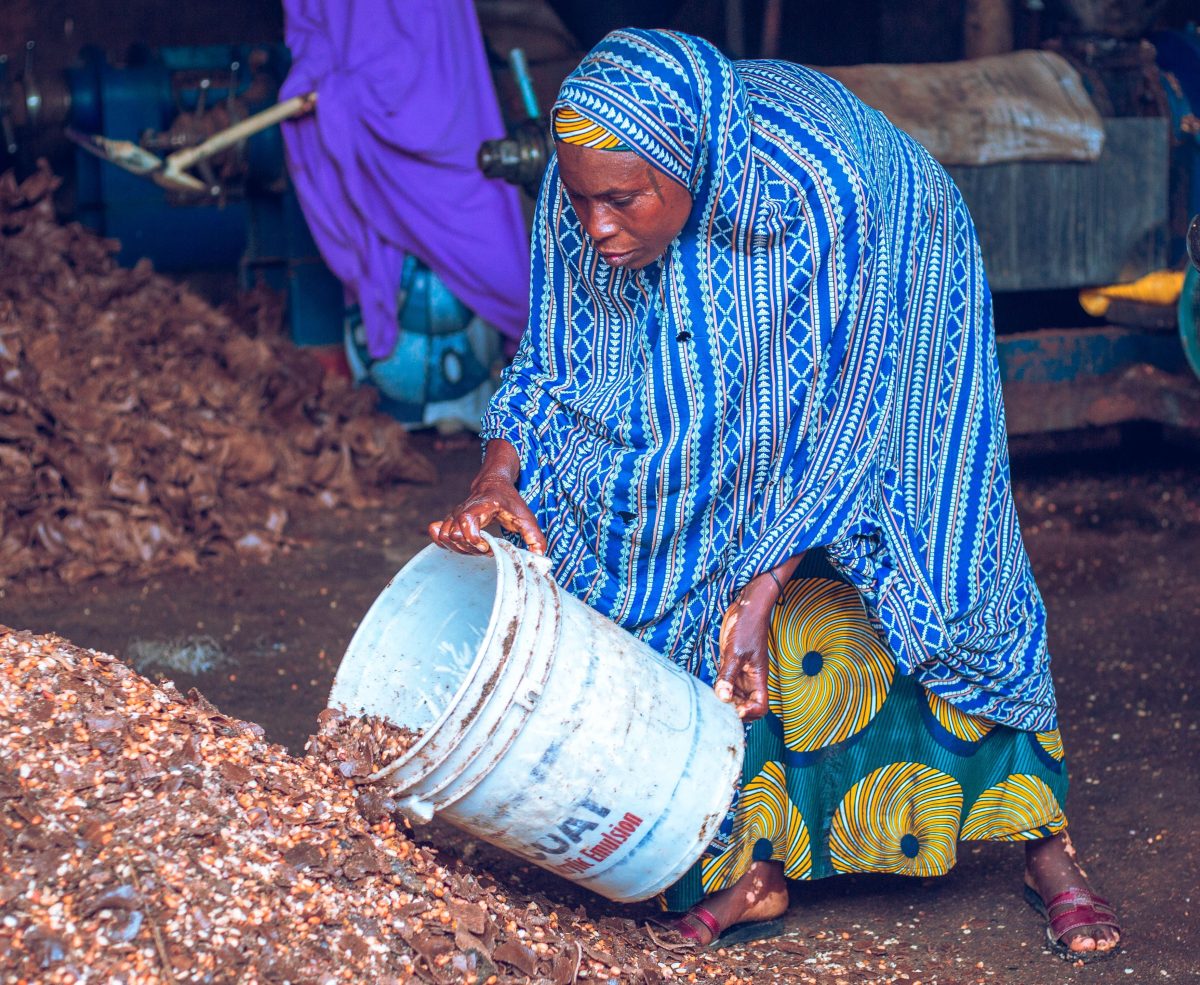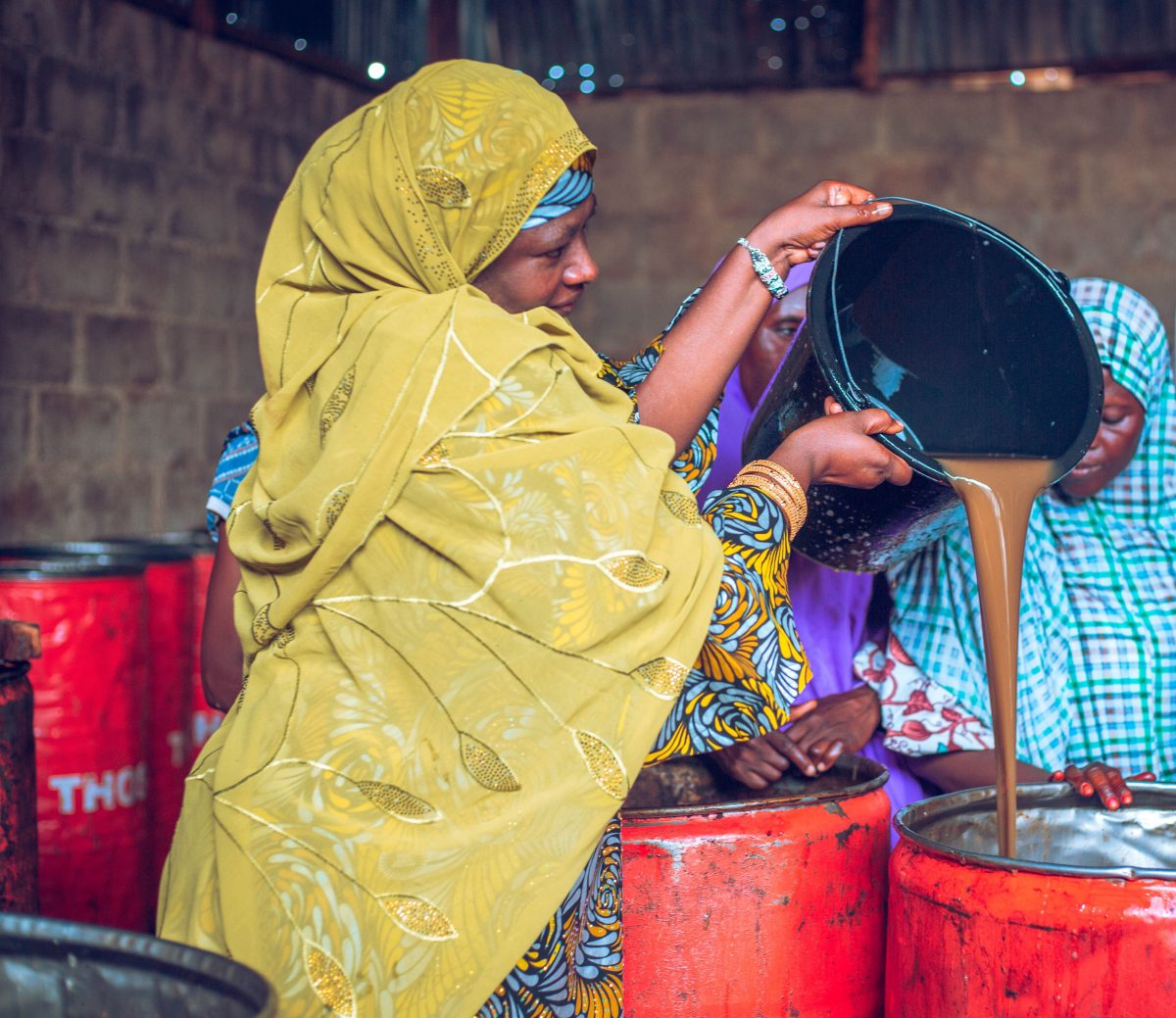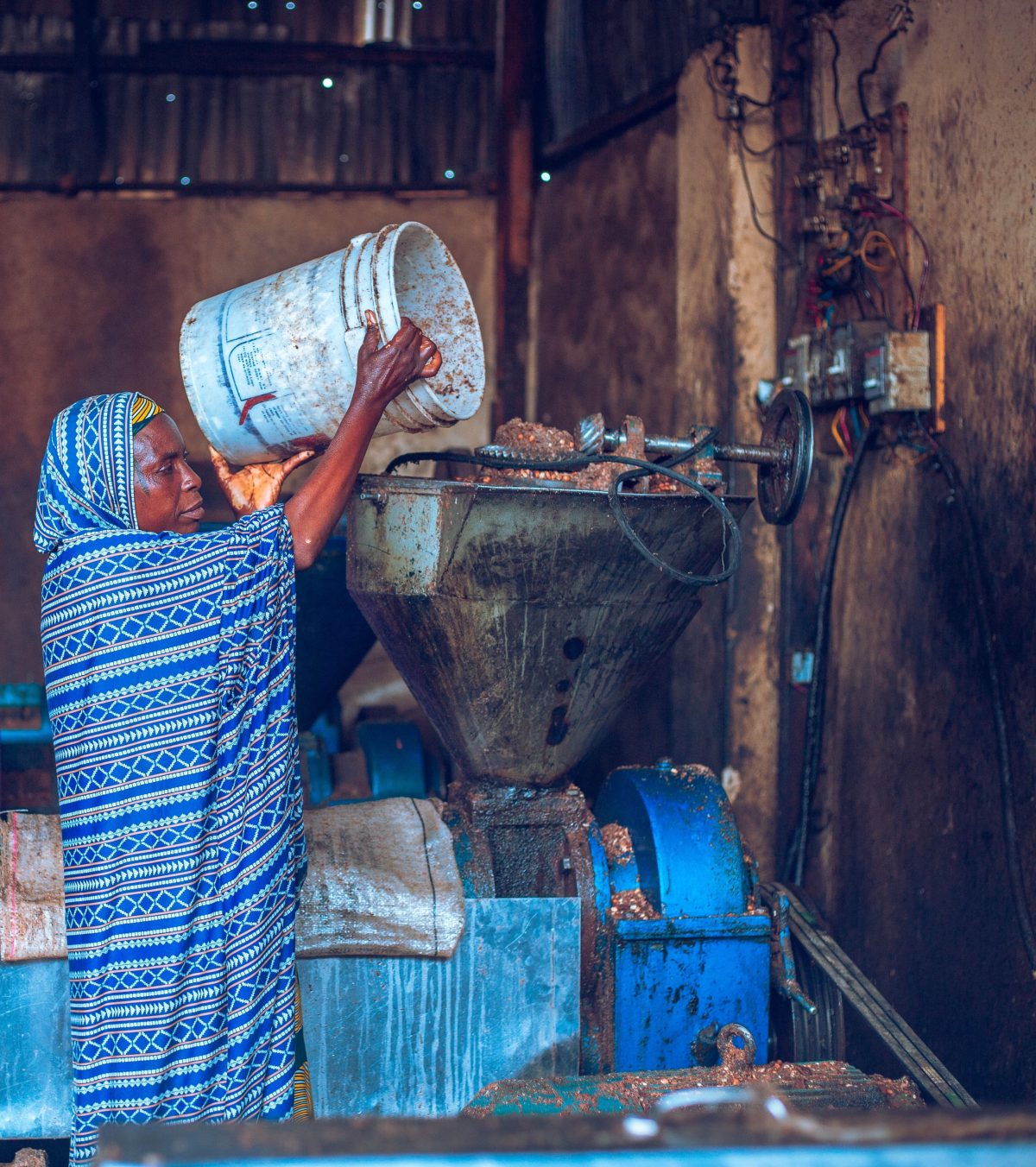The SME Investment Window is a component of the Investing in Women in Nigeria (IIW-Nigeria) programme, a CAN $15.7 million programme funded by Global Affairs Canada (GAC). This element of the fund comprises non-repayable grants totalling CAN $7.75m. Implemented by the AECF, the programme seeks to enhance women’s economic empowerment by promoting women’s participation in the traditional and non-traditional agribusiness sectors.
The programme seeks to:
- Enhance private sector engagement of women as economic actors across the key agricultural value chains.
- Increase private and public sector investment in women-owned Small and Medium Enterprises (SMEs) as well as other businesses that create economic opportunities for women.
- Reduce systemic gender inequalities that hinder women’s effective economic participation in climate smart agriculture.
Fund objectives
- Provide finance for small and medium-sized enterprises and finance institutions that use innovative technologies and other novel solutions to create gender-transforming, climate-smart economic opportunities for women, e.g., through employment creation, market linkages, suppliers of inputs/produce/services along the value chain.
- Provide targeted business development technical assistance and capacity building on gender mainstreaming for businesses.
- Advocate and increase awareness of the business case for investing in women in Kano.
- Provide incentives for innovations that will lead to sustainable widespread adoption of climate-smart practices in the agriculture sector and increase the resilience of both companies and the women that they work with to climate shocks.
-
Geography and Focus Area
Funding is available for private sector women owned/led SMEs that are commercially active in agricultural value chains in Kano with demonstrated linkages to women entrepreneurs operating in agricultural value chains in Kano.
Funding will target agricultural value chains that demonstrate high engagement and impact for women.
-
Eligibility
To be eligible for funding, private sector companies must meet the following criteria:
- Be a private sector enterprise that is aligned with the focus areas, i.e., geographical scope within agricultural value chains.
- Companies must demonstrate that they employ women, provide products and services that benefit women farmers and agro-business entrepreneurs, include women in their supply chain as suppliers of raw materials, and/or include women as distributors of products and services, in a substantial/dominant manner.
- Demonstrate female ownership or have a management that is predominantly women led, with a business model that delivers transformational benefits for women.
- Companies must demonstrate business models and commitments to increasing women’s representation as employees, customers, distributors and/or suppliers and proactively address barriers to women’s participation in climate smart agricultural value chains.
- Be proposing investment for innovative and climate smart technologies or business solutions that are gender transformative for women across agricultural value chains and improve resilience to climate shocks.
- Be able to show commitment to match AECF funding based on the ratios stated in matching contributions section below.
- Request grant funding within the stipulated range.
- Be compliant with fundamental laws and regulations in-country, including tax compliance laws.
- Be compliant with human rights, labour standards, and environmental management laws.
- Demonstrate commitment to gender equality and the empowerment of women, especially young women, in the conduct of the business.
- Be legally registered and physically established in Nigeria and must have operated for a period of not less than two (2) full accounting years at the time of application.
- MUST NOT be involved in any act of corruption. AECF requires that the applicant (including its staff, contractors, and suppliers) must not be involved in offering third parties, or seeking, accepting, or being promised by third parties, for themselves or any other party any gift, remuneration, compensation, or benefit of any kind whatsoever, which could be interpreted as an illegal or corrupt practice.
- MUST NOT be associated with prohibited activities by the Government of Nigeria, e.g., terrorism, money laundering, or be on a list of blacklisted businesses provided by institutions such as IFC (International Finance Corporation), USAID, UN, EU (European Union), etc, or provided under United Nations Security Council resolutions issued under Chapter VII of the UN Charter. The screening will be conducted for all applicants and associated parties on platforms such as https://sanctionssearch.ofac.treas.gov/, www.worldbank.org/debarr World-Check, EU sanctions list, etc.
- Demonstrate additionality;
-
Sectors
Eligible businesses must demonstrate that their offerings are accessible and affordable, directly benefit women and young women, and encourage the adoption of climate and gender appropriate technologies, products, or services.
Proposed initiatives can cover any part of the value chain but must demonstrate an ambition to address systemic challenges that keep women from more effectively engaging in agricultural markets to be eligible for funding. Examples of business models that will be attractive include (but are not limited to):
- Market aggregators who provide reliable and new market opportunities for women or women-owned enterprises to increase their profits and incomes.
- Information and media companies providing market information services to women and women-owned enterprises through traditional and digital platforms.
- Electronic/technology services (markets, finance, technology, and knowledge) linking value chain actors to the products and services of women-owned SMEs.
- Processors and/or manufacturing companies and/or market agents creating economic opportunities for women through employment creation and/or as suppliers of produce/services along the value chain and employees.
- Production and distribution models that support local entrepreneurship and growth of SMEs and women groups within the agricultural value chains in Kano.
- Business models that provide incentives for women to access and adopt improved use of environmentally friendly and climate-smart solutions and technologies.
- Business models that address climate-smart solutions and technologies at the household, production, transportation and processing levels in value chains.
- Information Technology companies providing digital platforms to create linkages between actors across value chains for Access to Inputs, Access to Market and or Access to Finance.
- Solutions that have linkages to multiple layers of agricultural value chains.
-
Funds Available
Applicants are expected to submit a funding application justifying their requirements for the business and/or idea to be funded, the funding amount and the project duration.
Funding must be used for a specific project, e.g., introducing new services or products, scaling up an existing enterprise or replication/expanding to a new market. Investees can apply for a range of funding depending on their development stage as follows:
- Minimum fund award CAN $ 65,000
- Maximum fund award CAN $ 1,300,000
Funding will be in the form of non-repayable grants. Funding is subject to meeting match funding criteria (see the section on Matching Contribution). Businesses should apply for funding depending on their stage of development and capacity to absorb funding for the proposed project. The absorptive capacity of businesses will be assessed during the application process and may be deemed to be less or more than requested.
Funding payments will be milestone based, where disbursements are based on mutually agreed milestones that must be achieved/delivered. Other conditions on disbursements may be introduced by AECF on an individual application basis prior to contracting.
Duration of the funding agreement: 4 years.
-
Investee Contribution
- AECF will require matching contributions from the applicant relevant to the award in order to demonstrate interest and commitment.
- Grant funding provided must be matched on a 1:0.5 basis , this makes the beneficiary contribution about 33.33% of the total project cost as a minimum (grant to matching funds).
- AECF can, in exceptional circumstances, provide lower matching fund requirements of 1:0.25.
- Matching contributions can be made either all in cash or a combination of ‘in cash’ and/or ‘in kind’.
- At a minimum, 50% of the matching fund contribution can be in-kind while the balance of the 50% can be in cash.
The matching contribution can be made up of the following:
-
Desired socio-economic impact
Business models must demonstrate how they deliver and sustain social impact in their target markets. Specifically, this means the number of households served by the product, service or a combination of both, improvements in women’s income, inclusivity of women, stimulation of market growth, and engagement of women -owned/led micro, small and medium enterprises (MSMEs) in the target value chains of the SMEs.
Companies should articulate their strategy to meet the following:
- Include women, especially young women, in the management of the organization.
- Gender-inclusive practices in their operations (e.g., women-centered design and collection of gendered data).
- Demonstrable benefits to women in terms of increased time available for other activities, improved health, reduced drudgery, and increased household spending power.
- Women-led supply chains; demonstrate the engagement of women, especially young women, in micro and small enterprises as key actors within the supply chain and potential opportunities for such women-led micro-enterprises to grow into SMEs.
- Qualitative indicators around women empowerment (e.g., ability to own assets; access to credit, use of existing women development structures to increase access to climate-smart technologies in the rural and peri-urban communities).
- Demonstrate a clear end-user mechanism/ strategy that enables target communities with low/irregular incomes to access improved climate-smart technology, practices, and services.
- Projects must be environmentally friendly, with the promotion of climate smart solutions particularly encouraged. Environmental impact assessments and mitigation measures approved by pertinent regulatory authorities must be obtained where required.
- Throughout the funding life, companies must demonstrate that they promote sustainable development outcomes in their target communities and market.
Progress in attaining the above will be measured through:
- Number of new jobs created by the enterprise (60% being for women).
- The volume of products or services bought from women owned SMEs in CAN$ or USD equivalent.
- The volume of inputs and or services sold to women and women owned SMEs.
- Number of poor and vulnerable people reached through awareness programming on social norms, by-products, and services.
- Number of eligible women owned enterprises expanding their business
-
Selection Criteria
Each applicant will be evaluated and scored against the following criteria:
- Outline of a commercially sustainable business model. The proposal must be technically sound and be aligned with the activities described in the Focus Area Section above.
- Must demonstrate a satisfactory performance record of the entrepreneur, technical person (s), or business. Where available, testimonials of past performance should be submitted.
- The proposal must include the CV(s) of key personnel with the education and experience required for the technical nature of the proposed project.
- The proposal must indicate the methods and degree of coordination with local administration and participating communities.
- Have a product certified in line with global standardization procedures and/ or supplied by a certified product manufacturer, clearly marked as an acceptable quality of the product.
- Demonstrate a track record of earning revenues from their users for existing product/service with demonstrated success in at least one market.
- Demonstrate sound financial health, including two years of audited financial accounts, established financial management processes and procedures and dedicated financial management staff – headquarters and in-country.
- Demonstrate investment relationships/ potential to access matching funds (based on the agreed ratio), leveraging additional and follow-on funding.
- Demonstrate how matching funds are to be made available, indicating details of when the contribution will be available.
- Demonstrate the capacity of the management team to implement the proposed business/project (adequate internal resources/capacity) – at headquarters and in-country.
- Demonstrate understanding of the country context and culture where the project is proposing to operate.
- Demonstrate how the business model will deliver and sustain social impact in the target markets (See Eligibility Section), i.e., demonstrate how to leverage AECF funding to secure commercial funding.
- In their business proposals, companies MUST describe their environmental impact and waste management policy and procedures and demonstrate alignment to global and national environmental management regulations. Investees are expected to provide an outline of potential waste that would emanate from their operations and how they intend to manage these.
- Demonstrate how gender analysis has informed the product/service design and how it will impact the project.
- Indicate any risks and threats to project implementation and methods that would be used to mitigate such risks.
-
Investment Principles
The AECF investment principles detailed below guides all investment decisions and shall be applied to evaluate proposed ideas and guide the final award decisions.
Investment Principles
- Private sector demand-driven: AECF is demand-driven, market sensitive and harnesses private sector initiatives and implementation capacity to achieve pro-poor economic and social outcomes.
- High Impact Models: funded projects must illustrate that they are of high social impact on key impact indicators as explained in the Monitoring and Evaluation (M&E)/ Performance Measurement framework.
- Systemic Change: the funded projects must illustrate the potential for pro-poor economic and social impact beyond their immediate project impact, which will change the way markets work.
- Address market failures or otherwise demonstrate additionality: The AECF funds projects that are constrained by market failures or access to finance within the context of the specific markets within which they are to be implemented.
- Risk sharing: AECF shares risk with private firms. The underlying principle is that the fund recipients have more at risk in the venture than the AECF. For practical purposes, recipient companies make financial contributions to the projects/businesses funded as this maximizes resource mobilization and applicant commitment to successful implementation. Companies’ financial contributions can be in the form of equity finance (external or shareholder equity injections), commercial or concessionary loans, and/or grants from other funding sources.
- Competition: AECF investing (grants) application process and term sheets are put in the public domain to ensure that all eligible organizations have equal opportunity to compete for the available funds and ensure transparency.
- Portfolio approach: The AECF seeks to build a portfolio of investments that are diversified in terms of risk, geographical distribution, sector distribution, and economic, social and market impact.
- Do no harm: the funded projects must take into consideration potential conflict and risk drivers to minimize potential harm and avoid negative impacts on social, economic and the environment.
- Business sustainability: the funded projects should demonstrate innovation and potential for sustainability.
-
Classification of additionality
A project is additional if it enables something to be achieved by the investee that would not have been achieved without the subsidy by AECF:
- Faster: The company could be expected to invest resources over several years, meaning development impact is delayed or lost. IIW-Nigeria funds can be used to enable the proposed investment/business to launch sooner, create transformational change quicker and expose the business to attract additional investments.
- Bigger: The company could be expected to invest its resources, but it would not be as large with IIW-Nigeria funding, thus enabling significant scaling for bigger development impact.
- Wider scope: The company could be expected to invest its own resources, but AECF resources will enable it to expand the scope of the goods or services geographically or to different groups of beneficiaries to multiply the development impact, and participation.
- More inclusive: The company will be able to access people closer to the bottom of the pyramid than it would otherwise have, enhancing the benefit to Women. Women tend to be difficult and expensive to reach, requiring physical networks, smaller packages of goods with smaller profit margins (or none), longer repayment terms, actualized by irregular payment patterns, and/ or susceptible to greater payment default. Applicants/ companies should be able to demonstrate how IIW-Nigeria funds will be used to cushion their businesses from such operating environment risks.
-
Commitments from successful investees
If selected, applicants must be committed to:
- Collaborate with AECF to finalize contract milestones and Key Performance Indicators. Indicators and milestones are agreed upon with AECF before signing the contract.
- Share data, including performance against indicators and milestones. All data will be treated confidentially unless otherwise agreed in advance.
- Gather, analyze, and share learnings from the project with AECF.
- Report according to agreed schedules and requirements.
- Participate in AECF/GAC annual program reviews.
- Ensure financial data and other management systems are accessible for audit purposes upon request.
-
How to Apply
The application window is now closed.
Termsheet

Programme Brief

Frequently Asked Questions


